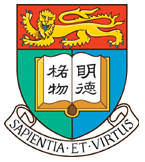Gu Wenda’s collaborative work at HKU will be based on the poetic scrambling of language he devised for his installation ‘Forest of Stone Steles: Retranslating Tang Poetry’ (see link here). But instead of having Gu himself supply the words, we are inviting all current and former students of HKU to provide your own poetic mistranslations, based on your time at HKU and your thoughts and feelings about our University.
When we have gathered all the submissions together, every participant will be invited to take part in an art workshop with Gu at the start of the 2012 Autumn semester, to write out the phrases you have devised in pen and ink. All of your contributions will then be bound into a book, which will be accessioned into the University’s collections, and placed on display to commemorate HKU’s centennial. Gu will also select examples of your calligraphy for inclusion in an artwork which will be placed on display in the Centennial Campus, as a memento of Gu’s visit, and of the University’s centennial.
How to participate
First, you will need to devise the phrase you would like to write out calligraphically. Gu’s procedure for doing so is set out in this downloadable pdf.
The procedure for HKU differs slightly. It can be broken down into the following steps:
1. Select your phrase.
Pick a phrase that communicates something you feel is significant about HKU. It can be written in Chinese or English; you can pronounce it in Cantonese, Putonghua, or however you prefer. Phrases tend to lengthen as you translate them, so you may prefer to pick something brief.
For example, let us pick a phrase that resonates with the University:
學習
2. Translate your phrase, literally, into English (or Chinese) as you see fit. For example, 學習 can be translated as “to learn and practice”.
3. Now, transliterate your Roman letters into Chinese characters (or vice-versa) phonetically, according to their sound, but in a way that still forms a coherent Chinese sentenc. So, for example, “to learn and practice” could be rendered as 圖樂呢暗被替思 with one Chinese character corresponding to each syllable of the English phrase. Using other homonyms you could, of course, arrive at a different result.
4. Translate your chinese sentence back into English. In this case, one possible translation would be “What about the search for joy? You thoughts would obscurely be substituted.”
Since we are not concerned here with correct translation, you have a lot of freedom, not only in selecting your phrase, but in how you interpret words and sounds at every stage. The most important thing is to end up with a phrase that you find suggestive, interesting, or resonant.
Once you have devised your phrase, send it, along with all the steps from 1 through 4 to the following e-mail address: guwenda@hku.hk. Similarly, if you have any questions or suggestion, please send them to this e-mail address.

